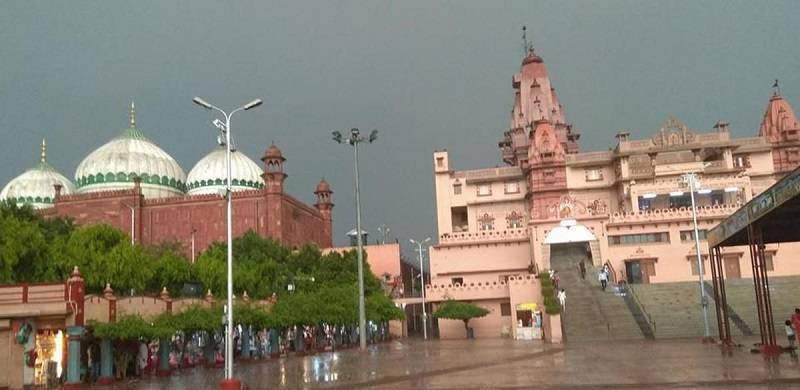
Hardline Hindu nationalist outfits have petitioned courts in Uttar Pradesh (UP) state, calling for Muslims to be prevented from entering the 17th-century Shahi Idgah mosque. The petitioners have gone to a local court in the town of Mathura, asking for entry of Muslims to the mosque to be halted until the outcome of an earlier petition that sought permission to search for Hindu relics on the site is decided.
In 2020, petitioners including Manish Yadav, Mahendra Pratap Singh and Dinesh Sharma had sought the appointment of an advocate commissioner for conducting a video survey in the Shahi Idgah mosque premises. The petitioners had claimed that the Shahi Idgah mosque was built after demolishing a part of the Shri Krishna Janmabhoomi temple nearby. They have demanded that the mosque be removed and this land be ‘returned’ to the temple. As part of this effort, the petitioners have demanded the right to perform filming and surveying activities at the site.
These activists claim that idols of Hindu deities were placed inside the mosque by Muslim rulers centuries ago, after they allegedly destroyed the nearby temple. This is in line with the claims of Hindu right-wing organisations that centuries of Muslim rule in South Asia led to destruction of Hindu religious sites.
Shahi Idgah is the latest in a spate of recent cases where such permission has been sought: a court in Varanasi allowed permission for videography at a mosque in that historic city. This surveying activity resulted in claims that a relic associated with the Hindu god Shiva had been discovered in the mosque – a claim rejected by Muslim groups, which maintained that the object in question was a fountainhead.
Hindu nationalist organisations have become more assertive in demanding access to Muslim sites, including mosques, where they claim Hindu relics were stashed or displaced in past centuries.
A number of Muslim groups and community leaders, including politician Asaduddin Owaisi, have pledged to legally challenge and resist such efforts, which they see as part of Hindu nationalist groups’ efforts to stir up communal strife under the rule of Prime Minister Narendra Modi’s government.
In 2020, petitioners including Manish Yadav, Mahendra Pratap Singh and Dinesh Sharma had sought the appointment of an advocate commissioner for conducting a video survey in the Shahi Idgah mosque premises. The petitioners had claimed that the Shahi Idgah mosque was built after demolishing a part of the Shri Krishna Janmabhoomi temple nearby. They have demanded that the mosque be removed and this land be ‘returned’ to the temple. As part of this effort, the petitioners have demanded the right to perform filming and surveying activities at the site.
These activists claim that idols of Hindu deities were placed inside the mosque by Muslim rulers centuries ago, after they allegedly destroyed the nearby temple. This is in line with the claims of Hindu right-wing organisations that centuries of Muslim rule in South Asia led to destruction of Hindu religious sites.
Shahi Idgah is the latest in a spate of recent cases where such permission has been sought: a court in Varanasi allowed permission for videography at a mosque in that historic city. This surveying activity resulted in claims that a relic associated with the Hindu god Shiva had been discovered in the mosque – a claim rejected by Muslim groups, which maintained that the object in question was a fountainhead.
Hindu nationalist organisations have become more assertive in demanding access to Muslim sites, including mosques, where they claim Hindu relics were stashed or displaced in past centuries.
A number of Muslim groups and community leaders, including politician Asaduddin Owaisi, have pledged to legally challenge and resist such efforts, which they see as part of Hindu nationalist groups’ efforts to stir up communal strife under the rule of Prime Minister Narendra Modi’s government.

